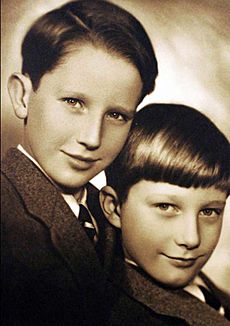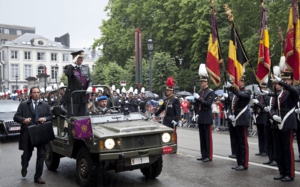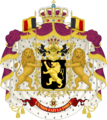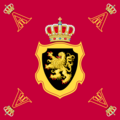Albert II of Belgium facts for kids
Quick facts for kids Albert II |
|||||
|---|---|---|---|---|---|
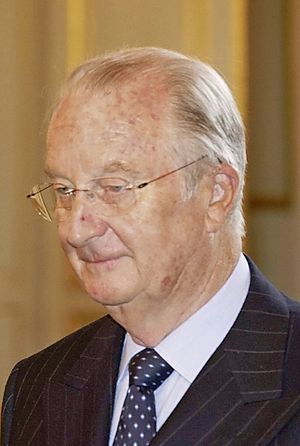
Albert II in 2010
|
|||||
| King of the Belgians | |||||
| Reign | 9 August 1993 – 21 July 2013 | ||||
| Predecessor | Baudouin | ||||
| Successor | Philippe | ||||
| Prime ministers |
See list
|
||||
| Born | 6 June 1934 Château of Stuyvenberg, Laeken, Brussels, Belgium |
||||
| Spouse |
Paola Ruffo di Calabria
(m. 1959) |
||||
| Issue | |||||
|
|||||
| House | Belgium | ||||
| Father | Leopold III of Belgium | ||||
| Mother | Astrid of Sweden | ||||
| Signature | |||||
Albert II (born 6 June 1934) is a member of the Belgian royal family. He was the King of the Belgians from 9 August 1993 until he stepped down on 21 July 2013.
Albert II is the son of King Leopold III and Queen Astrid. He is the younger brother of King Baudouin. Albert became King after Baudouin passed away in 1993. He married Donna Paola Ruffo di Calabria, who became Queen Paola. They have three children. Albert's oldest son, Philippe, is the current King of the Belgians.
On 3 July 2013, King Albert II announced that he would give up his throne on 21 July. This was due to his health. His son Philippe became King on that day. Albert II was the second Belgian monarch to step down. His father, Leopold III, also stepped down in 1951.
Contents
Early Life
Prince Albert was born on 6 June 1934. His birthplace was the Château of Stuyvenberg in Laeken, near Brussels. He was the second son of King Leopold III and Princess Astrid of Sweden. At birth, he was second in line to become king. He was given the title Prince of Liège.
When Prince Albert was one year old, his mother, Queen Astrid, passed away. This happened in a car accident in Switzerland in 1935. His father, King Leopold, later married Mary Lilian Baels in 1941. Albert and his siblings had a good relationship with their stepmother.
During World War II, in May 1940, Belgium was invaded. Prince Albert and his older siblings, Princess Joséphine-Charlotte and Prince Baudouin, left Belgium. They went to France and then Spain. They returned to Belgium in August 1940 and continued their studies.
In June 1944, the King, his wife, and the royal children were taken by the Germans to Germany and then Austria. They were set free by American soldiers in May 1945. Because of the political situation in Belgium, the family moved to Switzerland. Prince Albert continued his education there. King Leopold III, Prince Baudouin, and Prince Albert returned to Belgium in July 1950.
Marriage and Family
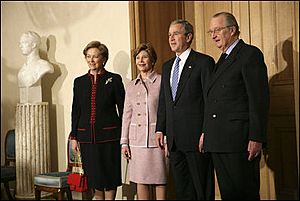
In 1958, Albert visited the Vatican. There, he met Donna Paola Ruffo di Calabria from Italy. Prince Albert asked her to marry him, and she said yes. They were married on 2 July 1959. Albert and Paola have three children, twelve grandchildren, and four great-grandchildren. Their children are:
- King Philippe (born 15 April 1960)
- Princess Astrid (born 5 June 1962)
- Prince Laurent (born 19 October 1963)
Princess Delphine
In 1997, it was reported that Belgian artist Delphine Boël (born 22 February 1968) was King Albert II's daughter. After a legal process, it was confirmed in January 2020 that Delphine Boël is indeed Albert II's biological daughter. Albert II accepted this news.
In October 2020, a court ruled that Delphine was legally recognized as his daughter. She was also granted the title of Princess of Belgium and the surname Saxe-Coburg.
Official Role
As the younger brother of King Baudouin, who had no children, Prince Albert was next in line to the throne. Albert's son Philippe was prepared to become king after him. When Baudouin passed away, Albert became King of the Belgians on 9 August 1993.
As King, Albert's duties included representing Belgium. He did this both in Belgium and in other countries. He went on state visits and attended important international meetings. He also showed interest in Belgian society, culture, and businesses. The King had a special role in the government. For example, in 2010–2011, when Belgium's parliament could not agree on a government, the King helped resolve the situation.
In 1984, he started the Prince Albert Foundation. This foundation helps promote Belgium's trade with other countries.
Abdication
On 3 July 2013, King Albert II announced his plan to step down from the throne. He told the Prime Minister and other leaders about his decision. At 79 years old, he decided to abdicate for health reasons. On 21 July, which is Belgium's National Day, he officially gave up his throne. His older son, Philippe, became the new King.
After he stepped down, he was still called His Majesty King Albert II. This is the same title his father, Leopold III, received after his abdication.
Images for kids
See also
 In Spanish: Alberto II de Bélgica para niños
In Spanish: Alberto II de Bélgica para niños
 | Ernest Everett Just |
 | Mary Jackson |
 | Emmett Chappelle |
 | Marie Maynard Daly |


